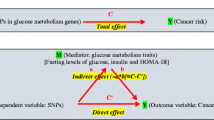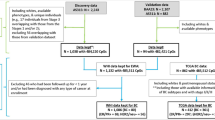Abstract
Glucose intolerance and insulin resistance are among the leading risk factors for breast (BC) and endometrial cancer (EC). Differences in the degree of association of these endocrine disorders with BC and EC can at least partly be explained by the diverse polygenic nature of the aforementioned metabolic shifts as well as of oncological diseases themselves. In 105 healthy postmenopausal women and 301 female cancer patients (110 BC and 191 EC) without overt diabetes mellitus, we compared the frequencies of the following genetic polymorphisms: insulin receptor substrate-1, IRS Gly972Arg; leptin receptor, LEPR Lys109Arg and Gln223Arg; mitochondrial uncoupling protein-2, UCP2_866G/A; and the ND3 gene of mitochondrial DNA, mtDNA 10398A/G. Genotyping was performed by allele-specific real-time PCR. The heterozygous genotype Gln/Arg of the Gln223Arg polymorphism in LEPR and the combination of the Gln/Arg and Gln/Gln genotypes proved to be associated with elevated risks of both BC (OR Gln/Arg = 2.03 (CI = 1.08–3.81), p = 0.027; OR Gln/Arg+Gln/Gln = 1.87 (CI = 1.02–3.43), p = 0.042) and EC ( OR Gln/Gln = 2.05 (CI = 1.00–4.17), p = 0.046, OR Gln/Arg = 1.88 (CI = 1.07–3.28), p = 0.026). Other markers (genotype UCP2_866AA and mtDNA polymorphism 10398A) appeared to be relatively more frequent in EC than in BC, which may account for lower insulin sensitivity and higher incidence of carbohydrate metabolism disorders in EC cases.
Similar content being viewed by others
References
Dil’man V.M. 1987. Chetyre modeli meditsiny (Four Models of Medicine). Leningrad: Meditsina.
Dedov I.I., Shestakova M.N. 2003. Sakharnyi diabet (Diabetes Mellitus). Moscow: Universum Publ.
Iozzo P., Beck-Nielsen H., Laakso M., et al. 1999. Independent influence of age on basal insulin secretion in nondiabetic humans. European Group for the Study of Insulin Resistance. J. Clin. Endocrinol. Metab. 84, 863–868.
Berstein L.M. 2005. Clinical usage of hypolipidemic and antidiabetic drugs in the prevention and treatment of cancer. Cancer Lett. 224, 203–212.
Goodwin P.J., Ennis M., Pritchard K.I., et al. 2002. Fasting insulin and outcome in early-stage breast cancer: Results of a prospective cohort study. J. Clin. Oncol. 20, 42–51.
Silvera S.A., Jain M., Howe G.R., et al. 2005. Dietary carbohydrates and breast cancer risk: A prospective study of the roles of overall glycemic index and glycemic load. Int. J. Cancer. 114, 653–658.
Eckel R.H., Grundy S.M., Zimmet P.Z. 2005. The metabolic syndrome. Lancet. 365, 1415–1428.
Reaven G.M. 2003. The insulin resistance syndrome. Curr. Atheroscler. Rep. 5, 364–371.
Lawlor D.A., Smith G.D., Ebrahim S. 2004. Hyperinsulinaemia and increased risk of breast cancer: Findings from the British Women’s Heart and Health Study. Cancer Causes Control. 15, 267–275.
Calle E.E., Thun M.J. 2004. Obesity and cancer. Oncogene. 23, 6365–6378.
Bershtein L.M. 2004. Onkoendokrinologiya: traditsii, sovremennost’ i perspektivy (Oncoendocrinology: Traditions, Current State, and Prospects). St. Petersburg: Nauka.
Vogelstein B., Kinzler K.W. 2004. Cancer genes and the pathways they control. Nature Med. 10, 789–799.
Wood L.D., Parsons D.W., Jones S., et al. 2007. The genomic landscapes of human breast and colorectal cancers. Science. 318, 1108–1113.
Imyanitov E.N., Togo A.V., Hanson K.P. 2004. Searching for cancer-associated gene polymorphisms: promises and obstacles. Cancer Lett. 204, 3–14.
Kaplan J.C., Junien C. 2000. Genomics and medicine: an anticipation. From Boolean Mendelian genetics to multifactorial molecular medicine. C.R. Acad. Sci. III. 323, 1167–1174.
Laakso M. 2004. Gene variants, insulin resistance, and dyslipidaemia. Curr. Opin. Lipidol. 15, 115–120.
Loktionov A. 2003. Common gene polymorphisms and nutrition: Emerging links with pathogenesis of multifactorial chronic diseases (review). J. Nutr. Biochem. 14, 426–451.
Liou C.-W., Lin T.-K., Weng H.H., et al. 2007. A common mitochondrial DNA variant and increased body mass index as associated factors for development of type 2 diabetes: Additive effects of genetic and environmental factors. J. Clin. Endocr. Metabol. 92, 1235–1239.
Gaziev A.I., Podlutskii A.Ya. 2003. Low efficiency of mitochondrial DNA repair system. Tsitologiya. 45, 403–417.
Skulachev V.P. 1999. Mitochondrial physiology and pathology; Concepts of programmed death of organelles, cells and organisms. Mol. Aspects Med. 20, 139–184.
Wallace D.C. 2005. A mitochondrial paradigm of metabolic and degenerative diseases, aging, and cancer: A dawn for evolutionary medicine. Annu. Rev. Genet. 39, 359–407.
Jellema A., Zeegers M.P., Feskens E.J., et al. 2003. Gly972Arg variant in the insulin receptor substrate-1 gene and association with type 2 diabetes: A meta-analysis of 27 studies. Diabetologia. 46, 990–995.
Salopuro T., Pulkkinen L., Lindstrom J., et al. 2005. Genetic variation in leptin receptor gene is associated with type 2 diabetes and body weight: The Finnish Diabetes Prevention Study. Int. J. Obes.(Lond). 29, 1245–1251.
Müllenbach R., Lagoda P.J., Welter C. 1989. An efficient salt-chloroform extraction of DNA from blood and tissues. Trends Genet. 5, 391–397.
Shamanina M.Yu., Vavilin V.A., Mordvinov V.A., et al. 2007. Polymerase chain reaction with real-time detection and its possible clinical applications. Vestn. Ross. Akad. Med. Nauk. 7, 37–26.
Zaggini A., Waadin I.N., Lindgran C.H., et al. 2007. Replication of genome-wide association signals in UK samples reveals risk leci for type 2 diabetes. Science. 316, 1336–1341.
Hoffmann K., Mattheisen M., Dahm S., et al. 2007. A German genome-wide linkage scan for type 2 diabetes supports the existence of a metabolic syndrome locus on chromosome 1p36.13 and a type 2 diabetes locus on chromosome 16p12.2. Diabetologia. 50, 1418–1422.
Richardson L.C., Pollack L.A. 2005. Therapy insight: Influence of type 2 diabetes on the development, treatment and outcomes of cancer. Nature Clin. Pract. Oncol. 2, 48–53.
Bershtein L.M., Merabishvili V.M., Semenova N.V., et al. 2007. Population analysis of combined cancer and diabetes mellitus: Frequency and specific features. Vopr. Onkol. 53, 285–290.
Slattery M.L., Samowitz W., Curtin K., et al. 2004. Associations among IRS1, IRS2, IGF1, and IGFBP3 genetic polymorphisms and colorectal cancer. Cancer Epidemiol. Bio-markers Prev. 13, 1206–1214.
Snoussi K., Strosberg A.D., Bouaouina N., et al. 2006. Leptin and leptin receptor polymorphisms are associated with increased risk and poor prognosis of breast carcinoma. BMC Cancer 6, 38.
Portolés O., Sorli J.V., Francés F., et al. 2006. Effect of genetic variation in the leptin gene promoter and the leptin receptor gene on obesity risk in a population-based case-control study in Spain. Eur. J. Epidemiol. 21, 605–612.
Rai E., Sharma S., Koul A., et al. 2007. Interaction between the UCP2-866G/A, mtDNA 10398G/A and PGC1alpha p.Thr394Thr and p.Gly482Ser polymorphisms in type 2 diabetes susceptibility in North Indian population. Hum. Genet. 122, 535–540.
Bai R.K., Leal S.M., Covarrubias D., et al. 2007. Mitochondrial genetic background modifies breast cancer risk. Cancer Res. 67, 4687–4694.
Fan J., McKean-Cowdin R., Bernstein L., et al. 2006. An association between a common variant (G972R) in the IRS-1 gene and sex hormone levels in post-menopausal breast cancer survivors. Breast Cancer Res. Treat. 99, 323–331.
Canter J.A., Kallianpur A.R., Parl F.F., Millikan R.C. 2005. Mitochondrial DNA G10398A polymorphism and invasive breast cancer in African-American women. Cancer Res. 65, 8028–8033.
Yu Y., Hao Y., Feig L.A. 2006. The R-Ras GTPase mediates cross talk between estrogen and insulin signaling in breast cancer cells. Mol. Cell. Biol. 26, 6372–6380.
Maeso Fortuny M.C., Brito Diaz B., Cabrera de León A. 2006. Leptin, estrogens and cancer. Mini Rev. Med. Chem. 6, 897–907.
Louet J.F., LeMay C., Mauvais-Jarvis F. 2004. Antidiabetic actions of estrogen: Insight from human and genetic mouse models. Curr. Atheroscler Rep. 6, 180–185.
Yager J.D., Davidson N.E. 2006. Estrogen carcinogenesis in breast cancer. N. Engl. J. Med. 354, 270–282.
Author information
Authors and Affiliations
Corresponding author
Additional information
Original Russian Text © Yu.M. Ulybina, E.N. Imyanitov, D.A. Vasilyev, L.M. Berstein, 2008, published in Molekulyarnaya Biologiya, 2008, Vol. 42, No. 6, pp. 945–953.
Rights and permissions
About this article
Cite this article
Ulybina, Y.M., Imyanitov, E.N., Vasilyev, D.A. et al. Polymorphic markers associated with genes responsible for lipid and carbohydrate metabolism disorders and insulin resistance in cancer patients. Mol Biol 42, 843–851 (2008). https://doi.org/10.1134/S0026893308060034
Received:
Accepted:
Published:
Issue Date:
DOI: https://doi.org/10.1134/S0026893308060034




